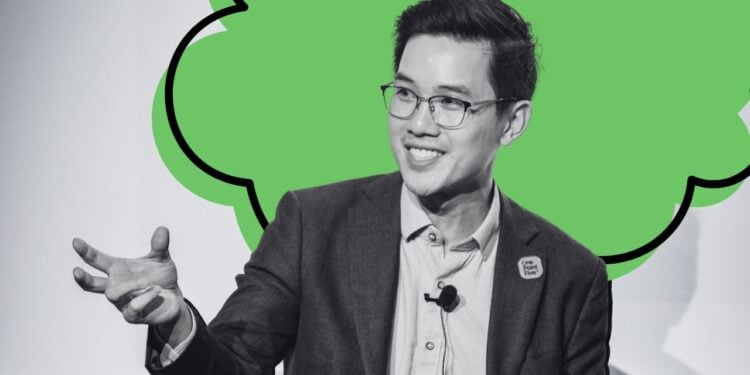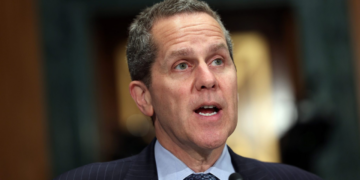- Neil Yeoh joined the Allwork.Space Future of Work podcast and emphasized the urgency of integrating green skills in the workforce to ensure sustainable growth and address resource depletion.
- Economic and career advantages of green skills are significant; possessing at least one green skill greatly boosts hiring prospects.
- Continuous learning and adaptation are essential for embedding sustainability across sectors and sustaining growth in the evolving job market.
This article is based on the Allwork.Space Future of Work Podcast episode featuring Neil Yeoh, the Founder and CEO of OnePointFive and a Forbes Next 1000-awarded climate leader. Click here to listen to the full episode.
In the latest episode of the Allwork.Space Future of Work® Podcast, Neil Yeoh, the Founder and CEO of OnePointFive and a Forbes Next 1000-awarded climate leader, spoke about the critical importance of integrating sustainability into our careers and daily lives.
With over a decade of experience in engineering, consulting, impact investing, and entrepreneurship, Yeoh outlined how green skills are becoming invaluable for the future workforce.
The Urgency of Sustainability
Yeoh explained the stark reality we face: people are consuming resources faster than the Earth can replenish them, and this unsustainable path underscores the urgency of implementing green practices, even in our careers.
“At some point in time, we’re going to run out of resources,” he said. “So unless we are thinking green, the future of business is at strife.”
Green skills, he argues, are essential competencies necessary for implementing environmental practices that enable sustainability.
Green skills encompass a broad range of abilities centered around environmental sustainability.
Traditional examples include transitioning to renewable energy sources like solar and wind power. However, Yeoh points out that green skills also involve reducing waste, conserving resources, and measuring emissions — all vital for combating global warming.
Historical data shows the transformation is possible.
Yeoh draws parallels with the rise of Lean Six Sigma in manufacturing, where operational efficiencies led to significant cost reductions and productivity improvements.
Similarly, green skills can optimize supply chains to use less water, energy, and resources, thus contributing to sustainable practices.
How to Embed Green Skills in the Workforce
One of the main barriers to the widespread adoption of green skills is the lack of awareness and specific training.
Yeoh’s frustration lies in the misconception that green skills are entirely new. Many industries have already embedded these skills under different monikers.
For instance, supply chain management, data modeling, and analysis are all critical for achieving net-zero emissions, as the primary environmental footprint of most companies lies within their supply chains.
Workers proficient in supply chain management could benefit from additional training on sustainable practices, enabling them to drive their organizations toward net-zero goals.
Yeoh mentions the importance of upskilling the workforce in more sectors so others can understand the environmental impact of their industries.
He says organizations should “set a net zero commitment, not only because it’s the right thing to do, but it’s also going to be the future in terms of workforce and sustainable growth.”
The Economic and Career Benefits of Green Skills
One of the most compelling reasons for adopting green skills is the economic advantage they produce.
Yeoh references the LinkedIn Green Skills Report, highlighting that acquiring green skills boosts one’s hiring prospects significantly.
In the United States, possessing at least one green skill increases hiring rates by 80%, and globally by 50%, according to Yeoh.
He pointed out that highly sought-after skills like greenhouse gas accounting or carbon accounting exemplify the demand for green competencies.
These specialized skills are difficult to acquire without practical experience. Yeoh highlights that academia, although pivotal in providing foundational knowledge, often falls short in keeping pace with the progressing needs of the industry.
The dynamic nature of green skills necessitates a practitioner-led approach to hands-on training.
Micro-credentials and organizational investment in continuous learning are essential to ensure that the latest regulatory and technological advancements are promptly integrated into the skillset of the workforce.
Growth and Demand for Green Skills
The demand for green skills is not just a current trend but a growing necessity. Yeoh explains that there are twice as many green-related jobs than the available supply of talent, underscoring a significant opportunity for professionals to upskill.
LinkedIn’s identification of 41,000 skills across 250 job categories, where approximately 1,200 are green skills, indicates a small but rapidly growing segment of the job market.
The impact is profound, as businesses now need to consider the environmental cost of their operations, such as the energy intensity of data centers, adding a new dimension to existing roles.
Looking ahead, Yeoh envisions a workforce where sustainability is woven into the fabric of every profession.
He advocates for continuous learning and adaptation, urging individuals and organizations to commit to net-zero emissions not only as an ethical responsibility but as a strategic imperative for growth in the future of work.
Embedding Sustainability Across Sectors
Yeoh shared the story of Starbucks as a leading example of embedding sustainability within an organization’s structure.
Despite having a small dedicated sustainability team, Starbucks ensures that sustainability skills are infused across various departments, from procurement to product development.
This distributed expertise allows the company to continue making progress on its sustainability goals despite changes in leadership and market conditions.
Yeoh elaborated on the concept of “carbon accounting,” drawing parallels with financial accounting to explain its importance.
Measuring environmental impact with the same rigor as financial health will soon become a standard practice, driven by emerging regulations in the U.S. and Europe.
This change is not just about compliance but also about creating a resilient, future-proof business strategy.
Call to Action: Embrace Green Skills for a Sustainable Career
The integration of green skills within the workforce is not merely a trend but a necessity for sustainable development.
Yeoh calls upon professionals to upskill in areas related to sustainability, arguing that such competencies are not only critical for the planet but also enhance career prospects.
By integrating green skills into our professional toolkit, Yeoh believes we can drive a collective movement towards a greener, more sustainable future.
If workers prioritize building these skills, it can not only addresses the pressing environmental concerns but also provides significant career advantages in a competitive job market.
As Yeoh aptly puts it, the future of our careers and our planet depends on the steps we take today to embrace and integrate green skills into every aspect of our work lives.


















